|
|
|
Sort Order |
|
|
|
Items / Page
|
|
|
|
|
|
|
| Srl | Item |
| 1 |
ID:
145524
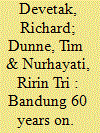

|
|
|
|
|
| Summary/Abstract |
This article examines the extent to which international society has been able to accommodate challenges such as the mid twentieth-century ‘revolt against the West’ and the twenty-first-century rise of new (especially non-Western) great powers. The Bandung conference of 1955 has commonly been seen as posing a threat to the fabric of international society by proliferating cultural and political differences. The authors show, on the contrary, that the political project of anti-colonialism and peaceful coexistence expressed at Bandung was actually consistent with a pluralist conception of international society, even if Western powers and intellectuals at the time failed to notice. The non-Western countries represented at Bandung were intent on expunging international society of the structures and practices of racism and colonialism so as to strengthen the foundations of a pluralistic international society better able to accommodate cultural and political differences.
|
|
|
|
|
|
|
|
|
|
|
|
|
|
|
|
| 2 |
ID:
145526
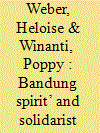

|
|
|
|
|
| Summary/Abstract |
It must come as no surprise that traces of any continuing relevance of the ‘Bandung spirit’ are enthusiastically being sought in the wake of the sixtieth anniversary of the Asian-African Conference. It was the first high-profile formal conference of newly independent (or ‘about-to-be independent’) post-colonial states at a rather momentous historical conjuncture: the continuing struggles for decolonisation were pronounced in the context of the Cold War. The Final Communiqué of the Bandung conference strongly articulated a collective political project against colonialism and imperialism, and for self-determination and racial equality, while already laying the foundations for the idea of strategic non-alignment in the context of the Cold War. It is in this sense that the Bandung conference has come to be emblematic of an event that inaugurated a radically different international political landscape to the immediate post-1945 world order. In this article, the authors focus specifically on the development aspirations articulated at the Asian-African Conference in Bandung, which they argue are the site of struggles and contradictions. As the authors show, the ‘Bandung spirit’ underlined the political project of Third Worldism, as well as the call for a new international economic order in the 1970s. Yet, they also identify some constraints and contradictions that the ‘Bandung spirit’ had to navigate and the challenges it was up against. In the final part of the article, the authors briefly discuss the extent to which the ‘Bandung spirit’ continues to resonate in contemporary global politics of development.
|
|
|
|
|
|
|
|
|
|
|
|
|
|
|
|
| 3 |
ID:
145522
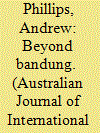

|
|
|
|
|
| Summary/Abstract |
The special issue this article opens examines the systemic impact, limits, achievements and legacies of the 1955 Asian-African ‘Bandung’ Conference. The Bandung conference is typically celebrated as a high point of Indonesian foreign policy activism and a key milestone in the emergence of the ‘Third World’. By contrast, mainstream international relations has paid comparatively less attention to its broader impact in the evolution of the modern international order. The special issue contributors here seek to correct this lacuna by interrogating Bandung’s significance in challenging, affirming and amending key aspects of the post-war global order. They also consider its relevance in setting important precedents that simultaneously foreclosed and enabled different manifestations of South–South cooperation thereafter. Beyond its historical significance, they finally explore Bandung’s enduring legacies for both domestic Indonesian order-building projects and Indo-Australian efforts to bridge the ‘Bandung divide’ in their responses to contemporary threats to international order. This article opens this inquiry by historically situating Bandung within its broader global context, unpacking its four ‘faces’ (order-challenging, order-affirming, order-building and order-transforming) and finally delineating the key axes of debate around which this special issue is organised.
|
|
|
|
|
|
|
|
|
|
|
|
|
|
|
|
| 4 |
ID:
131777
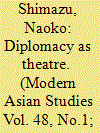

|
|
|
|
|
| Publication |
2014.
|
| Summary/Abstract |
As a significant 'moment' in twentieth-century international diplomacy, the rise of post-colonial Afro-Asia at the Bandung Conference of 1955 is replete with symbolic meanings. This paper proposes a conceptual approach to understanding the symbolic dimension of international diplomacy, and does so by ruminating on the newly unearthed Indonesian material on the Bandung Conference. To this end, 'diplomacy as theatre' is introduced as an interpretive framework to re-cast the conference as a theatrical performance, in which actors performed on the stage to audiences. Focusing on the city of Bandung, this paper reconstructs some examples of the 'performative' dimensions of international diplomacy, and elaborates on the notion of 'staging' the city and the role played by the people of Bandung, including the significance of conference venues, as well as the impromptu creation of a ritual citation that contributed to an iconic 'performative act' during the conference. Sukarno, Nehru, Zhou Enlai and Nasser all understood the importance as performers in their role as new international statesmen, representing the esprit de corps of the newly emergent post-colonial world. In deconstructing the symbolic, it will become evident that the role played by Indonesia significantly influenced the underlying script of the diplomatic theatre which unfolded at Bandung.
|
|
|
|
|
|
|
|
|
|
|
|
|
|
|
|
| 5 |
ID:
183779


|
|
|
|
|
| Summary/Abstract |
There is increasing agreement that states and other political actors on the world stage sometimes achieve international authority. However, there is less agreement about the nature and functioning of international authority relations. What determines whether an actor will be recognized as an authoritative actor? And what are the effects thereof? In this essay, we identify four distinct conceptions of authority in the study of international relations: authority as contract, authority as domination, authority as impression, and authority as consecration. Consideration of the typology leads to two important insights. First, the phenomenon of authority has an essentially experiential dimension. Subordinate actors’ emotional experience of authority determines their response to authority and thus also has a fundamental impact on the stability of authority. Second, the emergence of forms of international authority does not entail, at least not necessarily, the weakening of the sovereignty of states, but can equally be argued to strengthen it.
|
|
|
|
|
|
|
|
|
|
|
|
|
|
|
|
| 6 |
ID:
161619


|
|
|
|
|
| Summary/Abstract |
In light of seemingly growing divergence between the so-called ‘West’ and the Rest regarding the maintenance of international order, this paper seeks to sort through the conceptual muddle of ‘internationalism’ that still characterises much discussion of foreign policy today, especially with reference to emerging states. The leading states of the Global South have sought to respond to the crisis of conceptualisation and implementation that has attended Western practice of internationalism since the end of the Cold War. This paper seeks to analyse the alternative they claim to propose.
|
|
|
|
|
|
|
|
|
|
|
|
|
|
|
|
| 7 |
ID:
144759
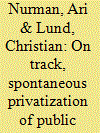

|
|
|
|
|
| Summary/Abstract |
The history of land control in Indonesia is overwhelmingly one of colonial conquest, government enclosure and expropriation of traditional property rights. However, beneath these great transformations, counter-currents also flow. Encroachment on state land and its gradual privatization by ordinary people sometimes gnaw at government property. Through a series of small, sometimes innocuous actions, people manage to undo the previous ownership regime. This article shows how settlers over a period of some 30 years – through a strategic mixture of civic disobedience and civic compliance – managed to appropriate, formalize and effectively privatize land belonging to the stateowned railway company in the city of Bandung. The authors argue that disobedient occupation and subsequent obedient payment of taxes, documentation of residence and 'normalization' of the area have reduced the company's ownership to thin formality, whereas new residents hold all the substantial elements of property rights to the land.
|
|
|
|
|
|
|
|
|
|
|
|
|
|
|
|
| 8 |
ID:
146643


|
|
|
|
|
| Summary/Abstract |
This Communication Article proposes that if the Bandung Spirit is to be revived in the twenty-first century, then this will necessitate an appreciation in the first instance of how different the world is today from conditions 60 years ago – both across the Global South but also, more particularly, in the West. The key shift may have been one from an assertive imposition of rule based on a clarity of vision and purpose, to a more insecure and reactive form of engagement that lacks direction.
|
|
|
|
|
|
|
|
|
|
|
|
|
|
|
|
| 9 |
ID:
164683
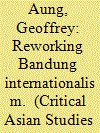

|
|
|
|
|
| Summary/Abstract |
This commentary examines how futurity has been imagined across politics and political economy in Burma/Myanmar. Three areas are discussed: the revolutionary horizons of anti-colonialists, who combined Buddhist and Marxist ideas of historical progress; the developmental socialism of the early independence area, with its industrial telos and modernist commitments; and a contemporary development project in southern Myanmar, where processes of dispossession are troubling earlier temporal imaginaries. I suggest that a vision of postcolonial transformation coheres across anti-colonial and early independence claims to futurity. This temporal imaginary, which I call postcolonial futurism, promises transitions from farm to factory, peasant to the proletariat, and precapital to capital. This imaginary resonated widely. Today, however, scholars of South and Southeast Asia argue that modernist promises of transition now lack empirical and political purchase amid ongoing dispossession and trends towards low-wage, informal labour. Yet in the wake of postcolonial futurism, responses to dispossession are creating novel political possibilities. Responding to Kuan-Hsing Chen’s call to rework Bandung internationalism in the present, I consider how struggles over dispossession today indicate both openings and limits for the making of new political futures. Integrating Glen Coulthard’s work on colonialism and dispossession, I argue that decolonizing subjectivity is central to this process.
|
|
|
|
|
|
|
|
|
|
|
|
|
|
|
|
|
|
|
|
|